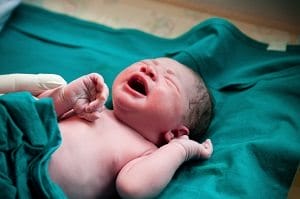The activation of immune cells when a baby is born may be a sign of an increased risk for food allergies, Australian researchers say in a new study.
Dr. Yuxia Zhang and Professor Len Harrison and their team report discovering a new immune ‘signature’ found in at-risk babies’ cord blood at birth.
“We found a link between children who had hyperactive immune cells at birth and the development of allergies to milk, eggs, peanuts, wheat and other common foods in their first years of life,” said Harrison, from the Walter and Eliza Hall Institute.
“In at-risk babies, immune cells called monocytes were activated before or during birth,” said Zhang, also of the Walter and Eliza Hall Institute. “Signals from these cells encouraged the development of immune responses by specialized immune cells called T cells that were predisposed to cause allergic reactions to some foods.”
The exact mechanism that leads from the newborn immune response to a food allergy being triggered is not yet known, researchers said, but that the findings point to a need for increased study of pregnancy and early life to understand the roots of allergic disease and chronic immune disorders.
Peter Vuillermin, an associate professor at Deakin University who also worked on the study, noted that most of the increase in food allergy over the last decades has been among children under 5. Vuillermin is leader of the Barwon Infant Study (BIS), an infant health study of more than 1,000 women and their babies, from which data for the current research was taken. He also sees the cell discovery as a key to unlocking the origins of childhood allergy.
“We don’t know why the increase in food allergy has occurred,” he said. “The important thing about this study is that we’ve shown the immune systems of babies who develop food allergy are in a sense ‘primed’ for allergic disease by the time they are born.”
The next steps, Harrison said, must involve figuring out why some babies have these “hyperactive” immune cells.
“Are the immune cells inherently activated because of the baby’s genes or do they become activated at the time of birth or earlier in pregnancy, and how?”






